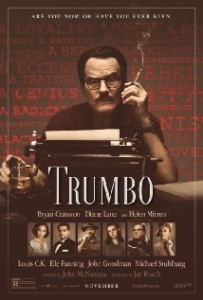The great work of American author Dalton Trumbo comes under fire when a big secret comes out about his lifestyle. In “Trumbo”, the year is 1947, literary author Dalton Trumbo (Bryan Cranston) is Hollywood’s top screenwriter until he and other artists were jailed and blacklisted for their political beliefs. The film (directed by Jay Roach) recounts how Dalton used words and wit to win two Academy Awards and expose the absurdity and injustice of the blacklist, which entangled everyone from gossip columnist Hedda Hopper (Helen Mirren) to John Wayne, Kirk Douglas and Otto Preminger. I myself am a big fan of Trumbo’s work ever since i first read “Johnny Got His Gun” in high school. Dalton’s majestic personality, as well as his attention to detail when it came to taboo subjects, is what always intrigued me and his readers alike. What Jay Roach’s newest film does is pay tribute to such an American rights activist, while showcasing a strong starring performance for Cranston. The film’s script is a bit jarring at times, but it’s held together by a stronger second half.
For a movie with such a star studded cast, I was surprised that really only two performances shined above the rest. Cranston is no question the perfect casting choice to play this role. His sarcastic wit, as well as physical features makes him a shoe-in to offer the audience an awestruck resemblence to the late writer. Cranston’s capability to play Trumbo as a man who fights for rights well ahead of the timeframe is what makes him intriguing to us. I also greatly admired how the movie didn’t shy away from the workaholic and alcoholic that Trumbo became to combat the mental stresses being given to his work on a daily basis. It’s amazing to watch some of the trials and tribulations that so many people had to go through just because they believed in a certain way of life. Helen Mirren also triumphs as an intended antagonist to Dalton and his co-workers. Mirren shines usually in every role she takes on, but as Hopper she brings back some of the brilliance of her late 90’s roles, when she was menacing without ever shouting or speaking in a threatening tone. There’s a lot in her performance which makes her easily the most dangerous of all of the opposites that Trumbo comes across, and that mostly has to do with everything she discusses always being on the record. Mirren gave the movie legs several times when the script searched for some form of intrigue. This all is not to say that everyone else did a bad job, but i felt that the performances of Diane Lane, Louis C.K, and Alan Tudyk were more of an impression, rather than a gripping performance that really made it their own. I only saw the actors in the roles, and never lost myself in their depth like i did to Cranston and Mirren. John Goodman is strong for a couple of scene stealers, but he isn’t in the movie nearly long enough to leave a lasting impression.
This brings me to the weak part of the film; the script. For such content that screams of a big screen adaptation, John McNamara’s script took too long to reach for it’s audience. I mentioned earlier how the film’s second half is much better than the first, and a lot of that has to do with similar scenes being used repeatedly during the first hour of the movie. There were far too many times when I felt like the movie should just cut to the point, but instead it was weighed down by slow storytelling that quite frankly bored me. The first act feels more like a period piece for the era and time, and less about it’s main protagonist while trying to market some compelling drama. One line uttered in the film by Cranston says “There’s a great movie somewhere in that terrible script”, and I couldn’t agree more. Roach’s direction is also a little questionable, mainly in making the content entertaining. There are plenty of long-winded lectures, but a lot of it feels like sitting through a dull history lesson, when something and someone this important deserved a tighter telling. The tone of the movie is also completely wrong, while coming off as cartoonish at times.
So what saves a film like this other than the performances it’s two main characters? The production design and cinematography that transports us to a more controversial time. The set designs and costumes are strong in stitch, and the surrealism of 1950’s paranoia against the Germans is very well documented. I am always a big fan of any movie that really captures the time period, and “Trumbo” definitely showcases the style, even if the substance isn’t always on par. The musical score is also brilliantly selected by Theodore Shapiro. Many scenes are wrapped in a smooth jazz sound that accompanies an age where men wore suits, women wore dresses, and buildings of all shapes and sizes appeared brand new. Shapiro left my toes tapping through several transitional scenes, where the cheeful music accompanies the times getting better for our main protagonist.
“Trumbo” warrants enough creative depth to check it out when it hits DVD shelves. There are definitely better films currently in theaters, but the wide range of Cranston and the devilish delight of Mirren shouldn’t be passed up for it’s lack of compelling storytelling. Dalton Trumbo is one of the most important writers in American history, but many people judged him by his choices, instead of his body of work that always spoke for itself. The film isn’t the most interesting of biographies, but it’s charm appeal can’t be denied.
6/10

Sounds like a pretty good movie. I enjoy films about the past, especially biographies. I haven’t seen many movies with Mirren in them, but the ones I have were excellent.
It was decent. Could’ve been structured better